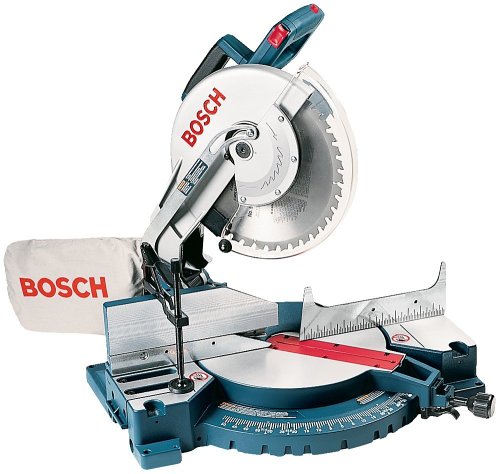Bosch 3912 15 amp 12-inch Compound Miter Saw with Dust Bag and Work Clamp Review

Bosch 3912 15 amp 12-inch Compound Miter Saw with Dust Bag and Work Clamp Feature
- Powerful 15 amp motor, 3.3 max. tool -horsepower
- Crown miting detents - 31.6-degree Miter and 33.9-degree Bevel detents for quick, accurate, crown cuts
- Large 25-inch aluminum base with 3-1/4-inch sliding extension for 28-1/4-inch total length - Provides extra support
- Speed-track sliding fence system - base and fence slide-independently
- Tall 3-1/2-inch sliding fence - For easy bevel setups and-increased crown molding cutting capacities
Choosing a Miter Saw
Miter saws are versatile tools that have become a mainstay of workshops everywhere. These powerful saws make angled cuts by pulling a circular blade down onto a workpiece with a short, controlled plunge. It might appear that miter saws are infinitely complex and varied, but there are only three general types. The type you choose will depend on your woodworking needs.
Basic Miter Saws
Basic miter saws are the least versatile off the three major variations, but they’re a great starting point for novice do-it-yourselfers. These models typically adjust for miter cuts only, so consider upgrading if you need to do more than that.
Compound Miter Saw
Compound miter saws are easier to use than basic miter saws because you can place your stock flat for cutting, and they adjust simultaneously for miter and bevel cuts. A compound miter saw is great for jobs that feature stock that's not very tall or wide, such as door and window trim or picture frames.
Sliding Compound Miter Saws
Sliding compound miter saws are the most versatile of the available models. They have a motor and blade assembly that's mounted on a moveable arm to accommodate longer, wider workpieces. For smaller pieces, the saw performs like an ordinary fixed-head model. On some models, the blade can only pivot in one direction, but on a dual sliding compound miter saw, the blade can tilt to the right or left.
Important Features at a Glance
Though models will vary by manufacturer and design, these are a few of the more commonly found features that you might want to keep in mind.
- Electric brake: Reverses the flow of electricity when the saw's trigger is released. This is an important safety feature that slows the blade quickly in case of emergency.
- Blade guard: Most miter saws have self-retracting guards that withdraw when the saw is lowered for use, and reappear when it is raised.
- Laser guide: Gives a precise visual line where the cut will occur on your workpiece.
- Dust bag: Helps collect sawdust for a clearer, more tidy cutting area.
- Shaft lock: Immobilizes the shaft and blade for quicker, easier blade changes.
- Table extensions: Mount on either side of the saw to help balance longer workpieces.
Miter Saw Blades
Miter saw blades come in a variety of different sizes, grades, and materials, but there are three main types: steel, high-speed steel, and carbide-tipped blades.
- Steel: Inexpensive and good for cutting soft woods or plywoods. Sharpness diminishes quickly in tougher materials.
- High-Speed Steel: More rugged than steel blades, and great for cutting harder woods.
- Carbide-Tipped: More expensive than other blades but much more durable. Maintain sharpness over a longer period.


No comments:
Post a Comment